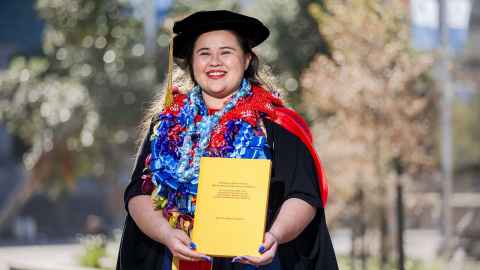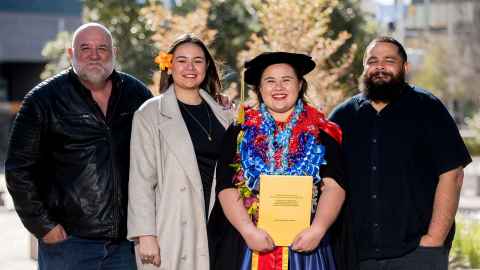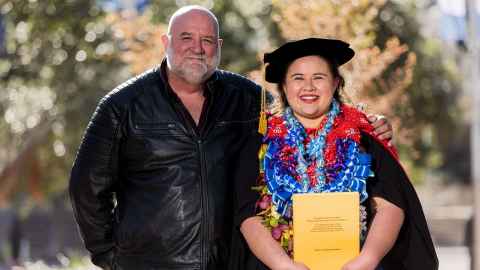Global pandemic leads to PhD success
06 September 2024
Covid-19 spurs pandemic study through experience of Sāmoan women.

When Covid-19 first arrived in Aotearoa, Dr Sarah McLean-Orsborn had little idea that navigating the pandemic would form the basis of her PhD.
The Waipapa Taumata Rau, University of Auckland Pacific Studies lecturer crossed the stage at the Auckland Town Hall on 5 September and was conferred with a doctoral degree.
McLean-Orsborn (Tapatapao, Moamoa, Papa Sataua, Scotland, Croatia, China) initially planned to focus her thesis on depression in Sāmoan women, instead Navigating a global pandemic, Sāmoan women’s experiences of Covid-19 was born from discussions about the pandemic.
“I started talking about what was happening, my husband wasn’t an essential worker, my father has a heart condition, I worried about him getting sick.
“What if our landlord decided to come back to New Zealand and we had to find another place? We were having these types of discussions.”
Having already done the provisional year for her doctoral degree, her supervisors suggested she write about living through the pandemic.
“They said why don’t you focus on the things you are worrying about, talk about the pandemic and what it’s like living through this.”
Her thesis is among the first study of Sāmoan women’s experiences of a health pandemic to be archived and written into history.
“Somebody pointed out to me, this is the first time Sāmoan women’s experiences of a health epidemic have been written about. When the 1918 influenza occurred, New Zealand didn’t care how it impacted Sāmoan women.”
She says undertaking her doctoral research was a great opportunity to explore experiences of not only women here in Aotearoa, but widening the scope internationally identifying where Sāmoan women are based around the world.
“We have gone from our usual diaspora of Australia, New Zealand and the US to now seeing Sāmoan women over in Oman, in France and Japan.”
It brought home the need to have a greater awareness, to understand and ensure how Sāmoan communities are looked after and cared for.
“While the majority of us are here [Aotearoa], we are a minority in other countries, and how do we ensure that our communities are looked after and cared for?”
Somebody pointed out to me, this is the first time Sāmoan women’s experiences of a health epidemic have been written about.

Researching the pandemic was also an opportunity to analyse health responses domestically and globally, and the decisions around policies that were made. It highlighted the need to think about how Pacific peoples as minorities, could spur a greater response at a political level says McLean-Orsborn.
She acknowledged the guidance and support of Pro Vice-Chancellor Pacific Professor Jemaima Tiatia-Siau, when first setting out on her postgraduate journey a decade ago. Prof Tiatia-Siau created a safe and encouraging environment allowing McLean-Orsborn to confidently articulate her future ambitions and life plans. The result was a doctoral scholarship to earn her PhD.
“It is because of Professor Jemaima Tiatia-Siau’s passion, care and heart as an educator that I have been able to obtain a PhD. There are truly not enough words for me to explain my gratitude to Jemaima for believing in me, pushing me and helping me to grow in this space.”
McLean-Orsborn was born in Tāmaki Makaurau Auckland, but home will always be Mulifanua in Sāmoa, where her parents moved to when she was seven years old. The eldest of three siblings, she is the family’s pioneer on both sides, being the first to receive a PhD, and she credits their support as crucial to her academic success.
“My husband Nick Orsborn has been by my main support and at my side since I started my honours degree. He’s a civil construction foreman, and his support has always been shown in his faith and belief in me – not batting an eye when I left full-time employment to take up the Doctoral scholarship.
“I’m very grateful to have his support and love, especially when the stress was overwhelming and all consuming. Having him remind me that this was something I could work through, that helped immensely.”
Father David McLean has also been there throughout her academic journey.
“Like Nick, Dad is a tradie, he’s had to learn throughout this journey, to just let me vent and talk through the challenges without trying to solve them,” she says in awe of her doting father.

“My department (Pacific Studies) were also a great support, with the writing retreats that were offered, the advice and support received from staff such as Dr Marcia Leenen-Young and Professor Yvonne Underhill-Sem.”
She thanked close friends: Whitney Radich, Catalina Labra-Odde, Zoë Henry, Dr Sarah Kapeli, and Emmeline Croft as super stars who walked alongside her, providing encouragement when she wanted to give up.
“It’s so necessary to have people, to have genuine fun, laughter and space with; because it’s so easy to get caught up in wanting to submit.
“I was so blessed to have Catalina, Zoë and Sarah gift me their time and brain cells to allow me to ramble to them; to better clarify and understand my own thoughts. Having people who would read your work or engage with your thought processes are so needed and I am grateful to have friends who could do that for me.”
As well as heading back to work, the university lecturer and academic researcher is taking steps to reclaim her language, as well as publish her research.
“I am currently on a journey to reclaim my language – it takes one generation to lose a language, and three generations to restore – this started with my dad who moved us to Sāmoa so we could have connection to our culture and language, however the Sāmoan language curriculum for non-speakers was not what it is today, but I’m trying.”